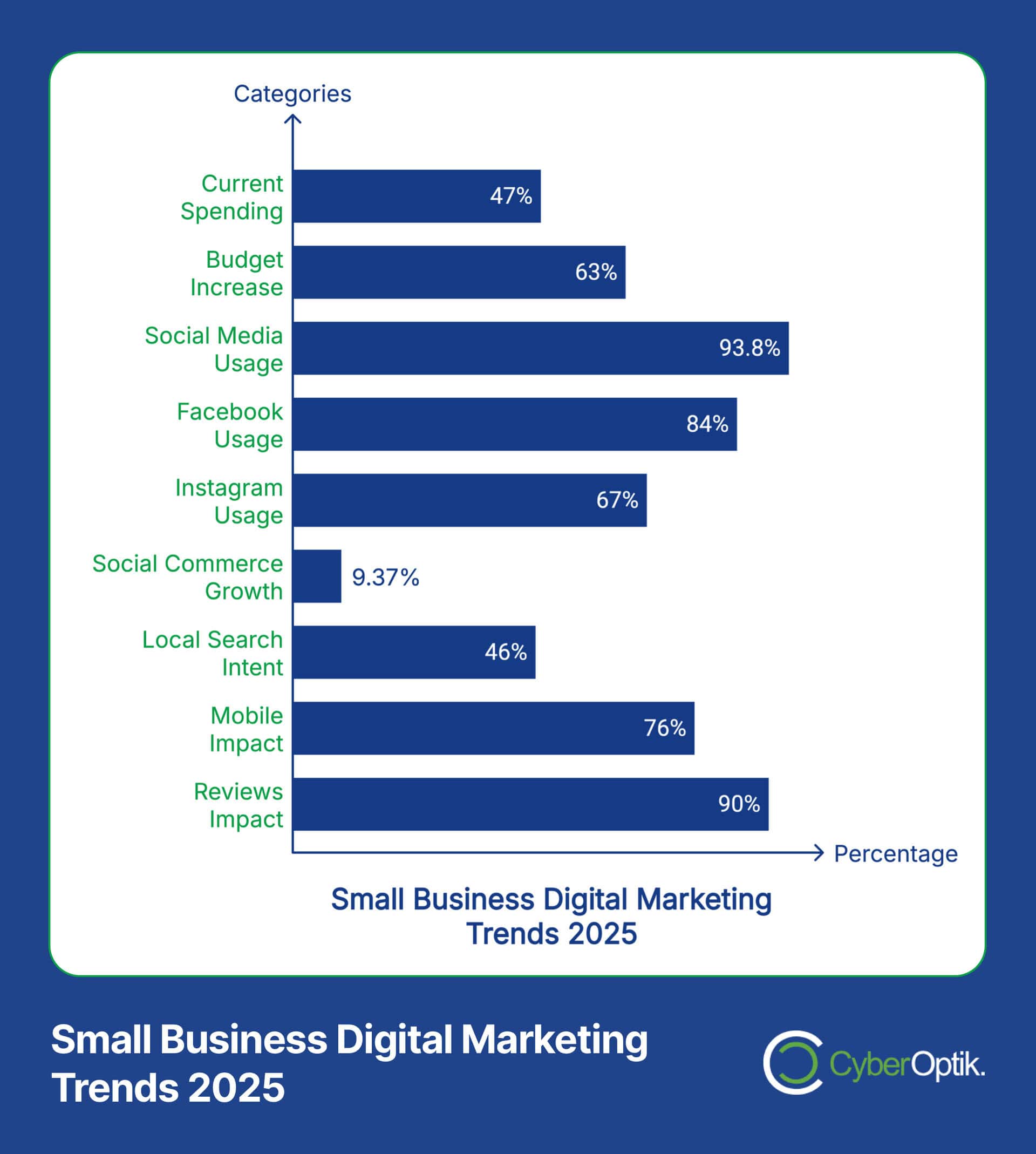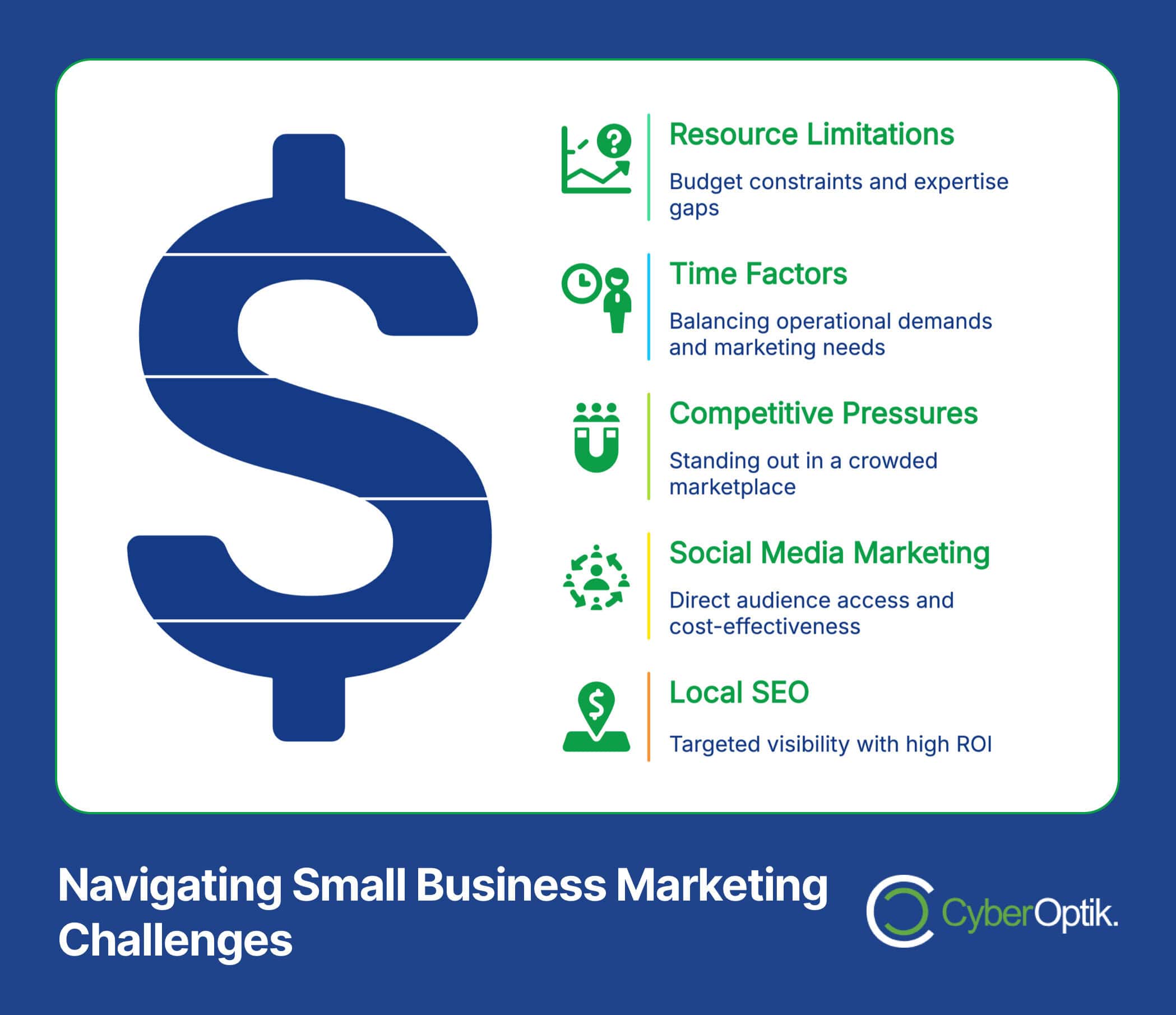Small businesses face unique marketing challenges. With limited resources, they need strategies that deliver maximum impact without breaking the bank. Today, we’ll focus on two of the most effective approaches: social media marketing and local SEO.
These complementary strategies help small businesses connect with customers where they’re already spending time—online. Used together, they create a powerful marketing foundation that drives awareness, engagement, and sales.
We’ve worked with businesses across Chicago seeking to improve their digital presence. Our experience shows these marketing approaches consistently deliver the best return on investment for small businesses. Let’s explore how to implement them effectively.
Why Small Businesses Need Effective Digital Marketing Strategies
The digital landscape offers unprecedented opportunities for small businesses. It levels the playing field, allowing smaller companies to compete with larger competitors. Yet many small businesses struggle to capitalize on these opportunities.
Recent data shows that 47% of small businesses spend less than $10,000 annually on digital marketing, but 63% plan to increase their budget in 2025. (Source: Statista) This indicates growing recognition of digital marketing’s value, despite implementation challenges.
The Digital Marketing Industry for Small Businesses in 2025

Digital marketing continues to evolve rapidly. The most successful small businesses adapt their strategies accordingly. They focus on channels that provide the best returns for their specific audience and business model.
Today’s consumers research products and services online before making purchasing decisions. This behavior makes digital visibility essential for local businesses. Without effective online marketing, potential customers may never discover your business.
Small businesses that prioritize digital marketing gain significant advantages. They connect with customers more effectively, respond to market changes quickly, and build stronger brand recognition.
Overcoming Common Marketing Challenges for Small Businesses

Small businesses typically face several marketing obstacles. Understanding these challenges helps develop more effective strategies.
- Limited budget and resources – Maximizing impact with minimal spending
- Lack of specialized marketing expertise – Learning essential skills or finding affordable help
- Time constraints – Implementing marketing while running daily operations
- Fierce competition – Standing out in crowded marketplaces
- Rapidly changing digital landscape – Keeping up with platform changes and trends
Effective marketing strategies address these challenges head-on. They deliver results without requiring substantial financial investment or specialized expertise. This is why social media and local SEO work so well for small businesses.
Leveraging Social Media Marketing for Small Business Growth
Social media offers powerful opportunities for small businesses. It provides direct access to target audiences, enables meaningful engagement, and supports both organic and paid promotional strategies.
Nearly all small businesses recognize this value. A significant 93.8% of small businesses use social media, with Facebook (84%) and Instagram (67%) being the most popular platforms. (Source: Business Dasher) These statistics highlight how essential social media has become for small business marketing.
What makes social media marketing effective for small businesses is its ability to build direct relationships with customers while maintaining relatively low costs compared to traditional advertising.
Choosing the Right Social Media Platforms for Your Business
Not all social media platforms deliver equal value for every business. The key is selecting platforms where your target audience is most active. Consider these factors when choosing where to focus your efforts:
| Platform | Best For | Business Types | Content Focus |
|---|---|---|---|
| Wide audience reach, community building | Local services, retail, restaurants | Mixed content, events, promotions | |
| Visual storytelling, younger audiences | Retail, food, beauty, design | High-quality photos, short videos | |
| B2B networking, professional services | Consulting, financial, B2B services | Industry insights, company news | |
| TikTok | Trend-based content, younger audiences | Fashion, food, entertainment, retail | Short, creative videos |
This platform selection should be strategic rather than trying to maintain a presence everywhere. Quality engagement on one or two platforms typically yields better results than scattered efforts across many.
Creating Effective Social Media Content Strategies
Once you’ve selected the right platforms, focus on creating content that resonates with your audience. Effective content drives engagement, builds brand awareness, and ultimately leads to conversions.
Successful small business social media content typically falls into these categories:
- Educational content – Tips, how-tos, and insights related to your products or services
- Behind-the-scenes – Showcasing your team, processes, and workplace culture
- Customer spotlights – Featuring customer success stories and testimonials
- Promotional content – Highlighting special offers, new products, or services
- Community engagement – Responding to questions and participating in conversations
The most effective approach balances these content types. Avoid excessive promotional content, which can drive followers away. Instead, follow the 80/20 rule: 80% value-added content and 20% promotional content.
Going Deeper
Learn more about creating an effective content calendar by exploring our guide to planning your social media content strategy for consistent and engaging posts.
Social Media Advertising for Small Businesses with Limited Budgets
Organic reach on social media platforms has declined over time. Paid advertising helps overcome this limitation. Even with small budgets, strategic ads can deliver significant results.
Social commerce continues to grow, with projections indicating a 9.37% annual growth rate through 2030. (Source: Sprout Social) This trend makes social media advertising increasingly valuable for driving direct sales.
For small businesses with limited budgets, we recommend these approaches:
- Start small – Begin with targeted campaigns focused on your local area
- Test formats – Experiment with different ad types to see what resonates
- Use retargeting – Reconnect with people who’ve visited your website
- Create lookalike audiences – Target people similar to your best customers
- Monitor performance – Track results and adjust campaigns accordingly
Remember that effective social media advertising doesn’t require large budgets. Precise targeting and compelling creative often matter more than spending volume.
Maximizing Local SEO for Small Business Success
Local SEO helps small businesses appear in location-based searches. This visibility is crucial for attracting nearby customers actively looking for your products or services.
The importance of local search can’t be overstated. Research indicates that 46% of all Google searches have local intent. (Source: LocalIQ) This means nearly half of all searches aim to find local information, businesses, or services.
Local SEO campaigns can achieve up to 500% ROI for many businesses when implemented correctly, making it one of the most cost-effective marketing strategies available to small businesses.
Google Business Profile Optimization Essentials
Google Business Profile (formerly Google My Business) serves as the foundation of local SEO. It controls how your business appears in Google Search and Maps. Optimizing your Google Business Profile significantly impacts your local search visibility.
Follow these steps to optimize your Google Business Profile:
- Claim and verify your profile – Ensure Google knows you’re the legitimate business owner
- Complete all information fields – Include business hours, services, description, and contact details
- Add high-quality photos – Show your products, services, team, and location
- Select primary and secondary categories – Choose the most accurate business categories
- Create Google Posts regularly – Share updates, offers, and events to keep your profile active
A well-optimized Google Business Profile significantly increases your chances of appearing in the local pack—the map-based results that appear for local searches. This placement drives both website traffic and direct business inquiries.
Local Keyword Strategies That Drive Foot Traffic
Effective local SEO requires targeted keyword strategies. These keywords help your business appear when potential customers search for your products or services in your area.
Local search has a significant impact on in-person visits. According to research, 76% of “near me” mobile searches result in a store visit within 24 hours. (Source: Digital SEO Land) This statistic illustrates the direct connection between local search visibility and physical business traffic.
| Keyword Type | Examples | Usage Strategy |
|---|---|---|
| City + Service | "Chicago plumber," "Chicago tax services" | Page titles, headings, meta descriptions |
| Neighborhood + Service | "Wicker Park coffee shop," "Lincoln Park dentist" | Location pages, content blocks |
| Near me" variations | "hair salon near me," "pizza delivery near me" | Schema markup, alt text, FAQ content |
| Local landmarks | "restaurant near Millennium Park," "shop near Navy Pier" | Location descriptions, directions content |
Implement these keywords strategically throughout your website. Focus on natural usage rather than keyword stuffing, which can harm your rankings. Create location-specific pages for businesses serving multiple areas.
Review Management and Local Citation Building
Reviews and citations play crucial roles in local SEO. They signal to search engines that your business is legitimate, reputable, and relevant to local searchers.
A significant 90% of brands note that online reviews have a substantial impact on their local search rankings. (Source: Soci) This underscores the importance of actively managing your online reputation.
Implement these review management practices:
- Encourage satisfied customers to leave positive reviews
- Respond promptly to all reviews—both positive and negative
- Address negative feedback professionally and constructively
- Incorporate keywords naturally in your review responses
- Maintain consistent review generation rather than getting many reviews at once
Alongside reviews, local citations help establish your business’s legitimacy. Citations are mentions of your business name, address, and phone number (NAP) on other websites. Ensure your business information remains consistent across all platforms to maximize local SEO benefits.
Integrating Social Media and Local SEO for Maximum Impact
While social media and local SEO work well independently, they deliver superior results when integrated strategically. This integrated marketing approach that combines multiple channels creates a cohesive online presence that reinforces your brand across multiple touchpoints.
Cross-Promotion Strategies
Use these cross-promotion strategies to amplify your marketing efforts:
| Strategy | Implementation | Benefit |
|---|---|---|
| Share location-based content on social media | Post about local events, community involvement, neighborhood guides | Reinforces local relevance, improves engagement |
| Promote reviews across channels | Share positive Google reviews on social media with graphics | Extends social proof, encourages more reviews |
| Create location-specific social campaigns | Run geo-targeted ads highlighting your local presence | Reaches local customers, reinforces location awareness |
| Leverage user-generated content | Encourage customers to tag your location in social posts | Creates authentic content, improves local relevance |
These strategies create multiple touchpoints with potential customers. Someone might first discover your business through a local search, then follow your social media for ongoing engagement, and finally convert through a targeted offer.
Measuring Success: Key Metrics and Analytics
Effective marketing requires regular performance measurement. Track these key performance indicators (KPIs) to evaluate your integrated marketing strategy:
- Website traffic from local searches – Visitors coming from Google Maps and local search results
- Social media engagement rates – Likes, comments, shares, and saves on your content
- Local keyword rankings – Position in search results for targeted local terms
- Conversion actions – Calls, form submissions, direction requests, appointment bookings
- Review velocity and sentiment – Rate of new reviews and overall sentiment
Regularly analyze these metrics to identify which strategies deliver the best results. Adjust your approach based on this data, focusing resources on the most effective channels and tactics.
Cost-Effective Implementation for Small Businesses
Implementing effective marketing strategies doesn’t require a massive budget. Small businesses can achieve significant results with strategic planning and focused execution.
DIY vs. Professional Marketing Support
Small business owners often debate whether to handle marketing in-house or hire professionals. Each approach has advantages and disadvantages.
| Marketing Tasks | DIY Viability | Professional Value | Suggested Approach |
|---|---|---|---|
| Social Media Content Creation | Medium | Medium | DIY with occasional professional support |
| Social Media Advertising | Low | High | Professional management for best ROI |
| Basic Google Business Profile Management | High | Low | DIY with training |
| Technical Local SEO Implementation | Low | High | Professional implementation |
The best approach often combines DIY efforts with strategic professional support. For example, you might handle daily social media posting while engaging professionals for campaign strategy and technical SEO work.
Tools and Resources for Small Business Marketers
The right tools make marketing implementation more efficient. Consider these cost-effective options for small businesses:
- For social media management: Later, Buffer, or Hootsuite for scheduling and analytics
- For local SEO: Google Business Profile Manager, Moz Local, or BrightLocal
- For content creation: Canva, Adobe Express, or RelayThat
- For review management: Google Alerts, Review Trackers, or GatherUp
- For analytics: Google Analytics, Google Search Console, and platform-specific insights
These tools help small businesses implement effective marketing strategies without significant financial investment. Many offer free plans or affordable pricing tiers specifically designed for smaller organizations.
Building a Sustainable Marketing Strategy
Effective small business marketing isn’t about implementing dozens of tactics simultaneously. It’s about focusing on proven strategies that deliver consistent results. Social media and local SEO represent this approach perfectly.
By implementing the strategies we’ve discussed, you’ll develop a strong foundation for your small business marketing. Focus on consistent execution rather than constant strategy shifts. Build your online presence methodically, with each effort supporting your overall goals.
Remember that marketing success comes through persistence. Results improve over time as you build audience engagement, search visibility, and brand recognition. Start with the fundamentals we’ve outlined, then expand your efforts as you see positive results.
Need help implementing these strategies? Our team at CyberOptik specializes in helping Chicago small businesses develop effective marketing approaches. We combine web design expertise with proven digital marketing strategies to help businesses like yours grow. Contact us today to discuss your specific marketing needs.




